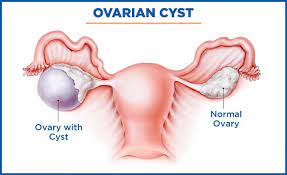Ovarian Cyst Removal Surgery
Ovarian cyst removal surgery, medically known as ovarian
cystectomy, is a surgical procedure performed to remove cysts that develop on
the ovaries. Ovarian cysts are fluid-filled sacs that can form on or within the
ovaries. While many ovarian cysts are harmless and resolve on their own, others
may cause pain, discomfort, or other complications, necessitating surgical
intervention.
Here is an
overview of ovarian cyst removal surgery:
Indications: Ovarian cystectomy is typically
recommended when:
·
The
cyst is large, causing pain or pressure on nearby organs.
·
The
cyst is suspicious for malignancy or cancer.
·
The
cyst persists or grows in size over time.
·
The
cyst causes twisting (torsion) of the ovary, leading to severe pain.
·
The
cyst interferes with fertility or poses a risk during pregnancy.
Procedure:
Anesthesia: Ovarian cystectomy is performed
under general anesthesia, which means the patient is unconscious and feels no
pain during the surgery.
Incision: The surgeon makes one or more small
incisions in the abdominal area, typically using minimally invasive
laparoscopic techniques. In some cases, a larger incision (laparotomy) may be
necessary for more extensive cysts or if cancer is suspected.
Cyst Removal: The surgeon carefully identifies and
removes the cyst from the ovary while taking care not to damage the healthy
ovarian tissue.
Biopsy: If there are concerns about cancer,
a tissue sample may be sent for biopsy during the procedure to determine
whether the cyst is malignant or benign.
Closure: After removing the cyst, the surgeon
closes the incision(s) with stitches or staples and may place a small drain if
necessary.
Recovery:
Recovery
from ovarian cyst removal surgery is typically quicker for minimally invasive
procedures compared to open surgery.
Patients may
experience some discomfort or pain after the surgery, which can usually be
managed with pain medications.
Most
individuals can resume normal activities within a few days to a couple of
weeks, depending on the type of surgery and individual recovery.
Follow-up
appointments with the surgeon are essential to monitor healing and ensure there
are no complications.
It's
important to note that not all ovarian cysts require surgical removal, and the
decision to proceed with surgery is based on various factors, including the
type of cyst, its size, and the presence of symptoms. A gynecologist or
gynecologic surgeon will evaluate the specific circumstances of each patient
and recommend the most appropriate treatment approach.
TX Hospitals is
one of the best hospitals in Kachiguda, Uppal, and Banjarahills with the
largest healthcare facility and the best team of doctors and specialistsurgeons to help patients recover fast from health ailments.
Book an Appointment with
the Best doctors in Hyderabad.
Call
Now 9089489089




Comments
Post a Comment